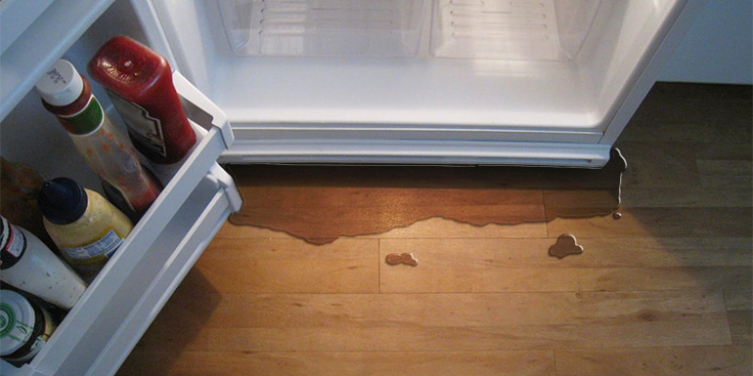
Mr. Rooter Plumbing explains why refrigerators leak water and how to fix it.
|
Your refrigerator may be leaking for one of several possible reasons. A blocked defrost drain, a damaged defrost pan, or a detached water hose are three of the most common reasons why refrigerators leak. Follow these troubleshooting tips to identify and fix the problem.
Check for a Blocked Defrost Drain
Self-defrosting freezers thaw ice buildup and drain it away. Unfortunately, if food, ice, or debris clogs the drain line, water is unable to flow out, which causes a leak.
If the leak is coming from the lower front of the refrigerator or freezer door, follow these steps:
- Unplug the refrigerator.
- Check the owner’s manual to discover where the drain tube is located. You may need to remove the cover panel at the bottom of the refrigerator to access the drain tube.
- Remove the bottom end of the tube and feed it into a bucket to catch any liquid that drips out.
- Remove the upper portion of the tube to completely disconnect it from the refrigerator. Use hot water or a stiff piece of wire to clean out the blockage.
- Reattach the drain tube and cover panel and plug the refrigerator back in.
In some refrigerator brands, the defrost drain is routed down the back of the refrigerator interior rather than down the exterior, causing water to pool below the crisper drawers at the bottom of the fridge. If this is the type of water leak you’re seeing, that means the defrost drain is located on the back wall inside the freezer. Follow these steps to clear a blocked defrost drain in this location:
- Unplug the refrigerator.
- Remove the crisper drawers to reveal the drain.
- Insert a small plumbing snake, pipe cleaner, or stiff wire to loosen the clog.
- Fill a cooking syringe or turkey baster with warm water and insert it into the drain tube to flush the clog away. Clean up any materials that wash out of the drain.
- Replace the crisper drawers and plug the refrigerator back in.
Check the Defrost Drain Pan
Fridges have drain pans where water collects as melted water is removed during the defrost cycle. If the leak is coming from beneath the front of the refrigerator or from the rear of the appliance, the drain pan may be to blame. Follow these steps to find out:
- Remove the cover panel at the bottom of the refrigerator to access the defrost drain pan.
- Check the pan for cracks, tears, or improper placement.
- If the pan is positioned incorrectly, adjust it. If it’s damaged, replace it.
- Check that the refrigerator is sitting level using a carpenter’s leveler. If the appliance is unbalanced, water may spill over the drain pan lip before it evaporates.
- Level a wobbly refrigerator using shims under one or more legs.
Check the Ice Maker and Water Dispenser
Refrigerators with ice makers and water dispensers could be leaking from poor plumbing connections. If the leak is coming from beneath the front of the refrigerator or from the rear of the appliance, and you determine the drain pan isn’t to blame, follow these steps:
- Unplug the refrigerator.
- Inspect the water supply line for cracks and the valve fittings for leaks.
- If your fridge has a water filter, inspect the housing for cracks.
- Tighten all connections, if possible, or replace damaged hoses, valves, and housings.
Contact Mr. Rooter® Plumbing for Home Plumbing Repair
If a poor plumbing connection is the reason why your refrigerator is leaking water, Mr. Rooter Plumbing is here to help. We can assist you with checking the appliance for leaks and troubleshooting the problem. Your quick response can help prevent extensive water damage in your home.
To schedule service with your local Mr. Rooter Plumbing, you can request an appointment online or call us.
This blog is made available by Mr. Rooter LLC, for educational purposes only to give the reader general information and a general understanding of the specific subject above. The blog should not be used as a substitute for a licensed plumbing professional in your state or region. Check with city and state laws before performing any household project.

